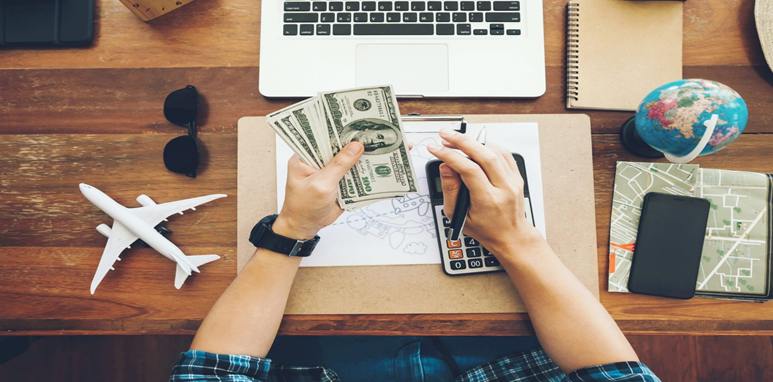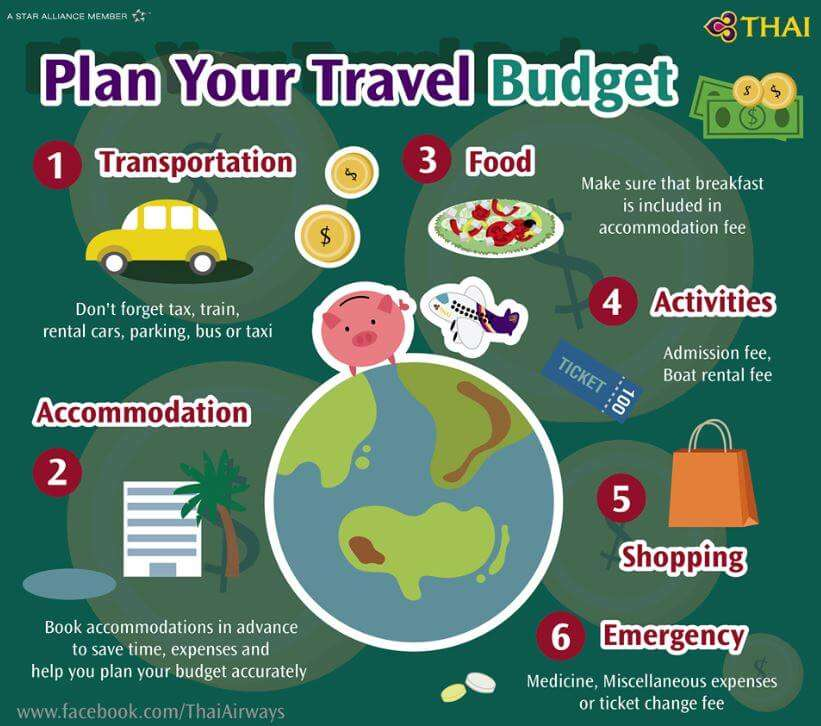Make a Travel Budget
If you are wondering how to make a budget for a trip, you’re in the right place. Traveling can be an enriching experience, but it’s essential to approach it with financial responsibility to ensure that you have enough money to make your trip a satisfying and perfect experience to treasure. One crucial aspect of trip planning is creating a travel budget. Now, if you are wondering why developing and planning your travel budget for a trip is vital, brace yourself and learn how to plan your future budget trip.
Make a Travel Budget
Make a travel Budget that ensures a memorable trip and financial stability before and after your journey.
To Ensure You Have Enough Money to Take This Trip, it is crucial to ascertain that you have the necessary funds to cover all expenses. From transportation and accommodation to meals and activities, a comprehensive trip budget helps you estimate your total expenses and plan accordingly.
To Ensure You Have Enough Money for Your Financial Obligations When You Return: It’s not just about spending money while you’re away; you must also consider your financial responsibilities back home. Neglecting bills like rent or car payments can have significant consequences. A well-planned travel budget ensures you set aside enough funds to meet these obligations upon your return. If you don’t want to unknowingly spend your rent or car payment while caught up in the excitement of travel
Read on if you are wondering how to make a budget for a trip.
To be a traveler, you must also possess your behavior in spending and budgeting money for a cause. Although you have saved that money for that specific trip, you still need to learn How to save money despite navigating your experiences to gain more memorable treasures of life. In this, you will uncover How to save money while traveling, including how you should start deciding what to bring and how you could pack light to avoid extra fees and facilitate more accessible travel that you would consider in planning your trip.
Make A Travel Budget
Creating a travel budget that ensures an enriching yet economical experience requires thoughtful planning and spending of your money and a keen understanding of your financial boundaries. Yet, spending money while remembering how to save money simultaneously is an ideal characteristic of a traveler. A manifestation of reasonable trip budget should cover all aspects of your travel experience, including transportation, accommodation, food, activities, and unforeseen expenses.
Here’s how to save money while traveling: allocating funds for each category ensures you have a realistic estimate of your total expenses. While traveling, you must still be mindful of how you spend your money. Start by researching your destination to get an idea of its typical costs. Look into accommodation, meals, transportation, and activities prices to establish a ballpark figure for your daily expenses. Once you estimate your daily expenses, allocate funds accordingly in your budget. Be sure to leave room for unexpected costs by including a small buffer in your budget. Embrace flexibility in your travel plans, which can lead to significant savings. Being open to alternative accommodation options, transportation methods, and activities can help you cut costs without compromising on the quality of your experience.
Apart from creating a travel budget, there are several other ways to save money while traveling, starting from how you pack your luggage to avoid extra fees and facilitate more accessible travel, utilize public transportation, seek out budget-friendly options, and always stay within your budget. Thus, start planning your trip today and embark on your future adventure.
Make a Travel Budget
Making a travel budget is imperative in planning your trips, ensuring that your travel experiences are both fulfilling and financially sustainable. Here’s why a budget is essential. Setting your financial limits will prevent you from overspending during your trip, helping you maintain financial stability and notice and prioritize experiences rather than spend a lot of your money on unplanned things. Whether visiting iconic landmarks or indulging in local cuisine, a budget helps you allocate funds to the aspects of your trip that bring you the most joy.
How Do I Organize My Travel Budget
Effectively organizing your travel budget is key to enjoying your trip. What you will read below is the step-by-step guide to help you create a well-structured travel budget:
Set Your Total Budget
Determine how much money you can comfortably spend on your trip. Including financial obligations when you return home is crucial to avoid any unexpected financial strain. As you establish your travel budget, factor in expenses such as rent or mortgage payments, utility bills, loan payments, groceries, and any other ongoing financial obligations you’ll need to cover upon your return. Doing so ensures you’re not depleting your resources entirely for the trip, leaving you vulnerable to financial stress upon your return. Striking a balance between enjoying your travel experience and maintaining financial stability at home is critical to ensuring a smooth transition back to your routine after your trip.
Research Costs
Look into the costs associated with your destination, such as accommodation, transportation, meals, attractions, and activities. While seeking free entertainment is a good idea, it’ll save you money, give you new experiences, and capture unforgettable and aesthetic moments. It is also important to budget for must-see attractions like the Eiffel Tower if you visit France.
Plan the Expense Ahead of Time
Utilizing resources like TripAdvisor, Lonely Planet, and budget travel blogs enables travelers to gather insights and meticulously plan their finances. Travelers can create a comprehensive budget that aligns with their financial means by researching accommodation, transportation, dining options, and activities. Moreover, these resources offer valuable cost-saving tips and recommendations, allowing travelers to be informed about the possible things to see in that specific location and avoid overspending. Planning also helps to minimize financial surprises during the trip; travelers can maximize their experiences, prioritize their expenses, and maintain flexibility to adapt to unforeseen circumstances, ensuring a memorable experience.
Categorize Expenses
Break down your expenses into categories such as flights, lodging, food, activities, souvenirs, and emergency funds. This will help you allocate your budget more effectively and ensure that funds are allocated appropriately to each aspect of the trip, allowing travelers to prioritize spending and manage their budget more effectively. By planning and allocating specific amounts to each category, travelers can enjoy their trip without overspending or encountering financial stress.
Prioritize Spending
Decide your trip’s most important aspects and allocate your budget accordingly. Whether you’re a foodie or an adventurer, prioritize spending on experiences that align with your interests. When budgeting for your trip, identify the most significant aspects, whether indulging in culinary delights, embarking on thrilling adventures, exploring cultural attractions, or simply enjoying relaxation. Prioritize allocating your funds to these key experiences that resonate with your interests and preferences. By focusing your budget on what matters most to you, you can maximize the enjoyment and fulfillment of your travel experience, ensuring that your resources are directed toward creating lasting memories and meaningful moments.
Use Budgeting Tools
Utilize apps like Mint, YNAB, Trail Wallet, or Excel spreadsheets to track your expenses and stay within your budget. These tools are invaluable for making real-time adjustments to your spending habits. Harness the power of budgeting apps such as Mint, YNAB, Trail Wallet, or even simple Excel spreadsheets to track your expenses and adhere to your budget. These tools offer real-time insights into your spending habits, allowing you to adjust on the go and stay within your financial limits. By monitoring your expenditures closely, you can identify areas where you may be overspending and make informed decisions to ensure that you remain on track with your budget throughout your travels.
Save for Your Trip
Start saving for your trip in advance by setting aside money regularly. Consider opening a dedicated savings account or using budgeting apps to help you reach your savings goals. Commit yourself to prioritizing regular contributions and investments for fulfillment, and you’ll steadily accumulate the necessary funds that ensure your financial readiness for your upcoming travel adventures.
Look for Deals
Keep an eye out for deals on flights, accommodations, and activities. Signing up for alerts from travel deal websites can help you save significantly on your trip expenses. Stay vigilant for discounts on flights, accommodations, and activities by subscribing to alerts from travel deal websites. Keeping an eye on these deals can lead to substantial savings on your trip expenses. Whether it’s last-minute flight sales, hotel discounts, or special offers on tours and attractions, staying informed allows you to capitalize on money-saving opportunities and stretch your travel budget further.
Plan for the Unexpected
Always have a buffer in your budget for unexpected expenses. Adding 10-15% onto your estimated budget can help cover unforeseen costs during your trip. This cushion provides financial security for handling unexpected circumstances like medical emergencies, transportation delays, or fees. Planning for these contingencies in advance gives you the peace of mind to handle unforeseen circumstances without jeopardizing your overall financial stability or disrupting your travel plans. Top of Form
Keep Track While Traveling
As you travel, keep track of your spending to ensure you stay on budget. Tracking your expenses in real-time allows you to adjust as needed to avoid exceeding your budget. Being conscious of tracking your expenses in real-time empowers you to make necessary adjustments to prevent overspending and maintain financial control throughout your journey. Whether it’s recording purchases in a travel journal, using budgeting apps, or simply checking your balances regularly, staying vigilant allows you to identify potential budgetary pitfalls early on and make informed decisions to stay on track. This proactive approach ensures that you can enjoy your travel experiences without the stress of financial worries, ultimately enhancing the overall enjoyment of your trip.
Review After Your Trip
After your trip, review your budgeting performance to gain insights for future trips. Reflecting on your spending habits can help you make more informed decisions when budgeting for your next adventure.
Making a travel budget is essential for a smooth and enjoyable travel experience. By following these steps and staying diligent with your budgeting efforts, you can make the most of your travels without breaking the bank.
Conclusion
A well-designed travel budget is the cornerstone upon which you can make a travel budget that is an unforgettable and financially prudent journey. Crafting a travel budget is not just about managing your finances for an upcoming trip. Still, it’s about ensuring a seamless, enjoyable travel experience that aligns with your financial goals and responsibilities. By following the steps outlined—setting a total budget, researching costs, categorizing expenses, prioritizing spending, utilizing budgeting tools, saving diligently, seeking out deals, planning for the unexpected, keeping track of expenses while traveling, and reviewing your budget post-trip—you’re setting yourself up for success. It ensures you can indulge in enriching experiences without compromising your financial stability, fostering lasting memories and a sense of fulfillment from your travels.


